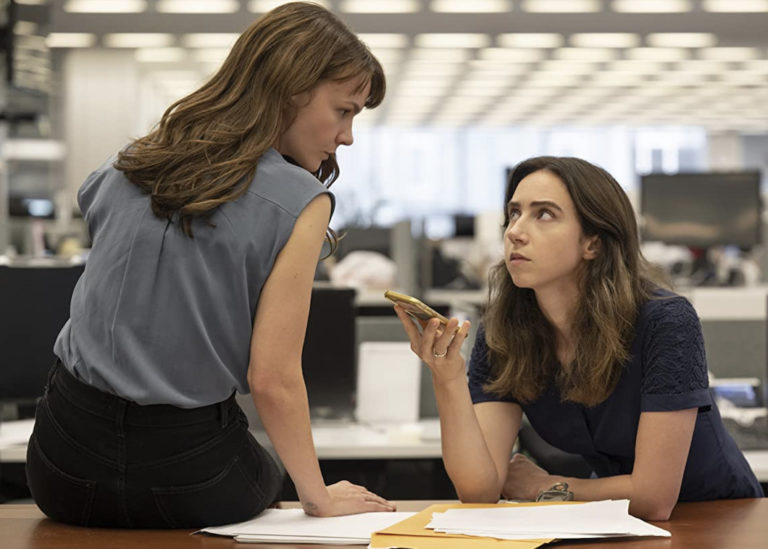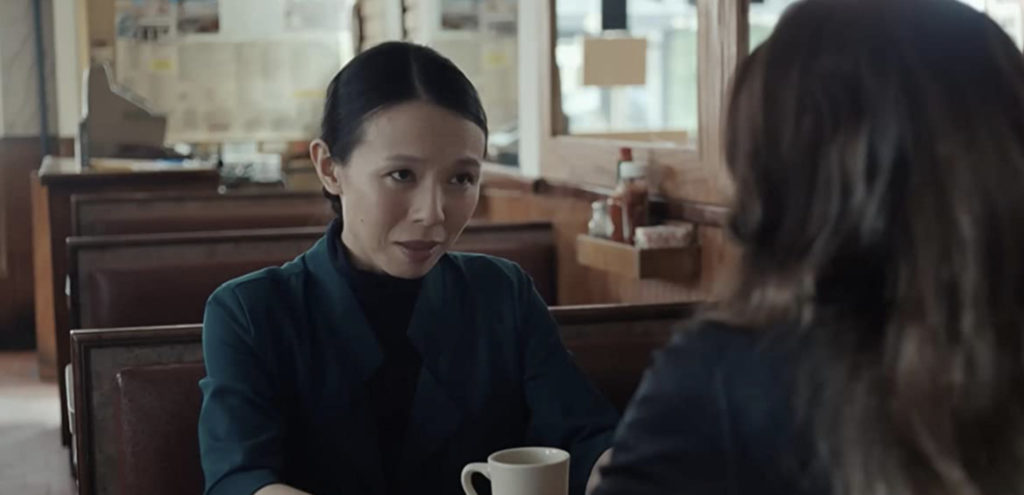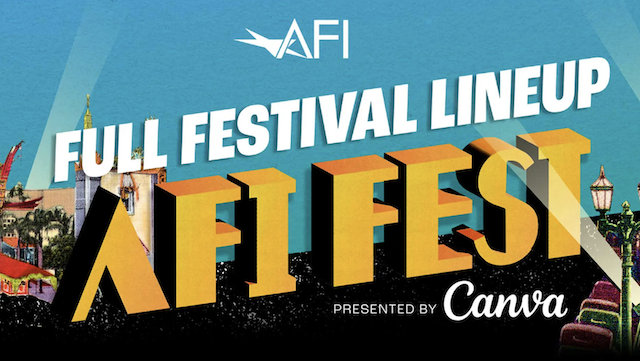
Synopsis : Two-time Academy Award® nominee Carey Mulligan (Promising Young Woman, An Education) and Zoe Kazan (The Plot Against America limited series, The Big Sick) star as New York Times reporters Megan Twohey and Jodi Kantor, who together broke one of the most important stories in a generation–a story that helped propel the #Metoo movement, shattered decades of silence around the subject of sexual assault in Hollywood and altered American culture forever.

Q : The actress like Ashley Judd has fans and the acting community to support her, but your character, Laura Madden is a regular mom and wife, it’s very hard for her to open up about her past when Harvey Weinstein took advantage of her, because of the risk of losing private life and backlashes.
JE : Well, I think I was very fortunate that script is so nuanced and so carefully distill, although Laura Madden who is an extraordinary human being in real life, who has showed us enormous courage by coming forward, and one of the first people to give a permission to Jodi and Megan to use her words. In the script, the way her character portrayed, you have a small little moment of her life , where you see a little tiny glimpse of her, and it’s sort of wonderful oblique, I think showing of character as you go through the film, you just get through the moment every now and then, you get to check in with her, see some part of her life. So when you get to know her better at the end, you have the opportunity to know her more intimately. I think the narrative has already laid out so many beautiful layers of her in there for the audience.
Q: You were in “The Miseducation of Cameron Post’ [dir Desiree Akhavan, 2018], [“The Comey Rule”, TV 2020], “The Good Fight” [TV] and now “She Said”. Is it important to you as a performer that your role has a political impact, a compromise, even?
JE: It’s wonderful. This is what I do for a living and I support my family. I will take whatever is most interesting of what comes my way. When something comes that also has a message that aligns with what I feel as a human being, then of course that’s going to be the first choice. But it really always comes down to the script. I think there is a certain something that can happen when you have a brilliant filmmaker who is also passionate about a subject. Those can often be the most interesting scripts. So it’s a beautiful meeting of things when everything comes together. But yes, I do love it when I believe in what the film is saying, then of course it’s extra-important to do it.
Q: All I can think of was how she would face her life in certain situations related to #MeToo and sexual harassment, and the fact that this movie plays on emotions so much compared to other movies.
JE: I think from the beginning, humans — wherever there’s a power dynamic that includes discrepancy, then there’s the possibility for abuse, sexual and otherwise. In all walks of life, and in any gender. It’s something that we have to be vigilant about. I think now we have a dialogue, now we have a shared vocabulary more than we ever have before, to be vigilant and transparent about this going forward and do our best to improve how safe people feel in their places of work.
Q: For this film, some of the actors talked to the people their characters are based on, and some decided not to talk to those people. Did you talk to Laura Madden, and what were your considerations to whether or not you decided to talk to her or not?
JE: I did not talk to her and it wasn’t suggested to me, so it wasn’t a choice, a decision I had to make. From the script, I had such respect for the choices that she made and the courage that she had shown, and shows. The script is so beautifully distilled and Laura Madden’s place in the film is beautifully nuanced and varied in the narrative — and honored, I hope.

Q: Something that was really strong in the movie is the loneliness of the survivors, but also by sharing their most isolated experiences, becoming part of a group and later a movement. But your character loses her anonymity in this process. What did you learn about the complex process of speaking up?
JE: Gosh, I don’t know if I would presume to say that I learned anything. I don’t know whether what I gleaned would be real or valid, I wouldn’t want to make that assumption. But I do know that the respect that I have for the people — the survivors and the witnesses who spoke up and stepped forward — is immense. I’m so grateful and have so much respect for them.
Q: This story is about so many brave women. Can you talk about when Laura Madden decided to speak? What was on the line for her? Why did it take so much courage to call out Weinstein even for somebody who wasn’t in the industry anymore?
JE: Oh, I think that’s a really good question, and I would love to hear Laura Madden answer that question. I don’t think I could. I wouldn’t presume to feel equipped to answer that question on her behalf.
Q: You have been working in the industry for quite a long time, and also, I believe, with Weinstein on “The King’s Speech” [dir. Tom Hooper, 2010]. I don’t know to what extent you actually met him. But what was your feeling when the Weinstein story broke in 2017?
JE: I think like everybody, it was an extraordinary moment, wasn’t it? To have something revealed with the magnitude of it, and you know that you’re just seeing the tip of the iceberg. And not only in this industry but in all walks of life. Anywhere where there is a discrepancy of power in the workplace — or even out of the workplace. Whatever combination of genders anywhere in the world, where people are isolated, there are possibilities of abuse of all kinds.
It’s wonderful that now, thanks to the courage of these women, these journalists and survivors, we’re able to have a dialogue about this and try to make change. I think we have a long way to go, but I’m so grateful to them that we’ve begun.
Q: Could you expand on “a way to go”? What’s still left to do?
JE: Oh, we have to be vigilant, we have to keep the dialogue open. I think we’re doing a great job in my industry now with intimacy coordinators, and our union cards have a number to call. I think there are many more stories now being told about human beings who happen to be women.
It used to be that you would often be the only woman on a set in front of the camera, and behind the camera — apart from hair and makeup and wardrobe — everybody else would be male. Not that there’s anything wrong with the men. But to now not be isolated in your sex alone on a set. I see lots of women on a set now, and it’s wonderful.
Q: Films have always been here to tell stories and to entertain. How important do you think film is to preserve history or to make historical events even more accessible and understandable?
JE: The capability, the reach, that cinema has, the ability to move people, the ability to reach an enormous number of people, the ability to reach people who are all sitting together in a cinema — that is very powerful. But I think we can’t ever assume that just because something is in a movie that it is true. I think this is maybe a dangerous assumption to make. I know that in the case of our movie, I trust that the people who made it put every possible intent in for that to be true. I wouldn’t want to go towards saying if something’s filmed, if something’s in a film, that it is the way things happened. But I think it’s mainly how many people, the reach that cinema has, the reach that the spoken word has, the reach that the written word has — they’re all so powerful. Journalism is so powerful.

Q: There were some actors and producers during the thirty-odd years of Harvey Weinstein’s control in the industry. There were people who noticed his misconduct and sexual harassment but swept them under the rug, pretending not to notice. When it comes to the #MeToo movement we realize the hero is a woman. But the man has to realize even more that those things have to be stopped. Could you talk about that?
JE: I hear you, but I don’t think it can be separated by gender. Men can be abused in situations of power discrepancies as well as women can. I think people are abused any time it’s possible for any abuse to happen when there is a discrepancy of power in any industry. So I think regardless of gender, we have to keep a dialogue open and be vigilant, and speak up if we see something that needs to be exposed. Transparency, have each other’s backs, regardless of our gender.
Q: Do you think there’s a chance in politics when we have a setback of women’s rights, there’s a chance in the industry or what we gain in the film industry is never to be taken back again?
JE: I don’t think anything is ever to be taken back again. I think if we’re not vigilant, things can be eroded. I also think that things sometimes sweep one way and then they sweep the other way. There’s like a pendulum shift that happens, and it takes a while for things to settle down. But I think the power of this story is that when a group of people speak out together against something, that great change can be begun.
Q: You mention great change can be begun. Is there anything that you remember in your life that was a good investigative reportage?
JE: Yes. The [clergy abuse scandal], something I’ve been very interested in lately because I just played a part that involved part of it. The taking of indigenous children in the United States and Canada away from their families to be forced to assimilate. That needs a lot more investigation. I think we’re just beginning to learn about it.
Q: The film talks about what happened but does not show any of the rape scenes, which is an interesting choice and a good choice. Did you have any discussions with [director] Maria Schrader about showing the graphic-ness of what happened without showing actual rape scenes?
JE: By the time I came on board, all these decisions had been made, I think very intelligently and brilliantly. I think the way they chose not to visually show any of the sexual violence is brilliant and powerful. But I didn’t have conversations about it because the decisions were already made.
Q: Thank you.
Check out more of Nobuhiro’s article.
Here’s the trailer of the film.

